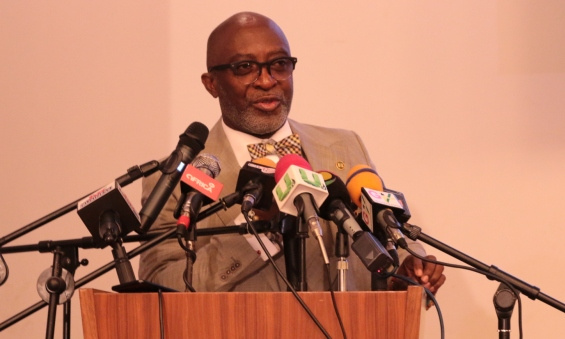Mr Yoofi Grant, the Chief Executive Officer of Ghana Investment Promotion Centre, says the use of different currencies across Africa for trade is a huge barrier to the continent.
He said it would be much easier for African countries to trade if there was a single currency.
“I should be able to trade in Nigeria with one currency because it is just one hour away and we should own our own data, the currency of the world is data,†Mr Grant said.
He said a move towards a single currency should be one of the critical things leaders on the continent must look at and address to promote trade.
READ ALSO:Â Dominic Adu becomes first Ghanaian CEO of First National Bank
Mr Grant was speaking at the United Capital Plc’s e-conference on the theme: “Fostering Innovative Cross-Border Financing Solutions in Africa. “
The e-conference discussed how to close the massive funding gap in key sectors across the continent, with the use of financing solutions across Sub-Saharan Africa.
He said lack of capital was making it difficult for micro enterprises to make big leaps, necessitating the need for great thinkers, who are willing to look inwards.
Mr Grant said for any form of development to take place, there must be political stability and the continent must do away with cheap capital or cheap funding that takes it off the objective of its development.
Mr Wale Shonibare, Director, African Development Bank, said the African Continent has to improve cross-border trade and also build regional interconnections, “we also need to embrace one currency.â€
He said under the bank’s Desert to Power initiative, they were creating the world’s largest solar zone to provide power to 250 million people.
“We should put more effort to develop our local capital market and also invest in education,†he added.
Mr Gbenga Makinde, Chief Executive Officer, UBA Benin said financing regional trade was a key strategy that was helping the bank to penetrate the African Market.
“We need to look inwards to solve our problems and have currencies we can use to finance the challenges we have within,†he said.
He said the continent needed to adopt the regional trade as a strategy to penetrate its market; and “if we have Pan African banks following this path, we will definitely proffer solutions within Africa.â€
Mr Peter Ashade, the Group CEO of United Capital Plc. said over the years, cross border financing across Sub-Saharan Africa had played a limited role in effectively addressing the funding gap across key economic sectors in the continent.
He said Foreign Direct Investment flows from China have surged from $0.5 billion in 2003 to $43 billion in 2017, meanwhile, France, Netherland, the US, and the UK remained the largest investor economies in Africa with over $60 billion investment each as at 2017.
He said while data on intra-regional investment was scarce, the African Development Bank estimated that between 2006 and 2016, intra-African greenfield investments grew from $4 billion to $10 billion, while the number of intra-regional mergers and acquisitions doubled from 238 deals in 2006 to more than 418 in 2016.
“While this progress is laudable, so much more is still required,†he said.
He said the socio-economic impacts of the globally devastating COVID-19 had further exposed the vulnerabilities of the region as it continue to grapple with infrastructure development challenges compounded by capital flight to safer havens to mention a few.
“Obviously, this begs for innovative home-grown financing solutions to help strengthen Africa’s economic resilience and perhaps, propel the continent through a new phase of growth,†he said.
He said the bank was contributing its quota as a responsible financial institution and reputable Capital Market operator by creating platforms to enable experts, comprising of the continent’s finest professionals, to proffer insights from their wealth of experience on how to change the narrative.
Source: GNA





